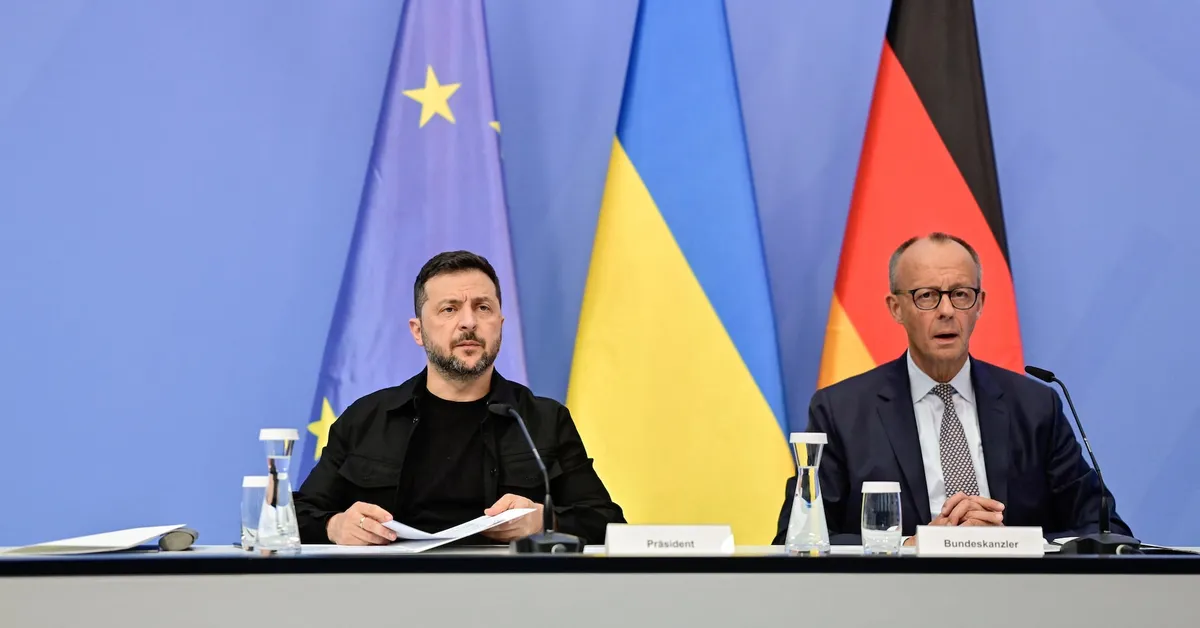
BERLIN/KYIV, Aug 13 (Reuters) - In a critical diplomatic effort, Ukrainian and European leaders are actively working to persuade U.S. President Donald Trump against striking a potentially detrimental peace deal with Russian President Vladimir Putin. This meeting, scheduled for Friday in Alaska, is aimed at addressing the ongoing conflict in Ukraine, which has persisted for over three and a half years and is recognized as the most significant conflict in Europe since World War II. The potential implications of a peace deal have raised alarms in Kyiv, with concerns that it could compromise Ukraine's sovereignty and territorial integrity.
Trump has indicated that a resolution to the conflict may involve a territorial swap between Ukraine and Russia, a suggestion that has sparked fears of significant concessions by Kyiv. Such a deal could result in Russia gaining control over almost 20% of Ukrainian territory, raising concerns among European leaders about Putin's intentions to further expand his influence in Eastern Europe.
On Wednesday, Ukrainian President Volodymyr Zelenskiy flew to Berlin for crucial virtual meetings hosted by Germany, where he engaged with European leaders and discussed strategies to present a united front to Trump. Among the attendees were leaders from Finland, France, Britain, Italy, Poland, and representatives from the European Union, as well as NATO Secretary General Mark Rutte. This collaboration aimed to shape the narrative ahead of the Alaska summit and ensure that any decisions regarding Ukraine would not occur without its direct involvement.
Trump has tempered expectations for the upcoming talks, describing the Alaska meeting as primarily a listening exercise to gauge what is necessary for a peace deal. His previous frustrations with Putin's lack of cooperation had led to uncertainty about the summit's outcomes. However, after weeks of mixed signals, Trump's agreement to meet with Putin signals a shift in his administration's approach, with officials indicating that progress has been made in previous discussions in Moscow.
Despite this progress, senior European officials express concern that a deal could emerge that undermines both European unity and Ukraine's security. They emphasize the necessity of maintaining a coordinated response to prevent any unfavorable agreements. One senior Eastern European official stated, "We are focusing now to ensure that it does not happen - engaging with U.S. partners and staying coordinated and united on the European side."
Amid these diplomatic efforts, a recent Gallup poll revealed that 69% of Ukrainians support a negotiated end to the war, but there is a strong sentiment against making sacrifices that jeopardize Ukraine's territorial integrity. Zelenskiy emphasized that any agreement requiring troop withdrawals from the eastern Donbas region, which is largely occupied by Russian forces, would be unacceptable. He stressed that discussions regarding territorial issues should only commence once a ceasefire is in place and Ukraine receives necessary security guarantees.
In a statement, Zelenskiy remarked that conceding to Russian demands would effectively create vulnerabilities that could enable further Russian advances into Ukraine. Conversely, Russian officials, including Foreign Ministry spokesperson Alexei Fadeev, have reiterated that their preconditions for a ceasefire remain unchanged, which includes the withdrawal of Ukrainian forces from regions claimed by Russia and a formal renunciation of Ukraine's NATO aspirations. Kyiv has firmly rejected these conditions, viewing them as a pathway to surrender.
As the Alaska summit approaches, a coalition of nations dedicated to supporting Ukraine in the event of a ceasefire will convene online following Trump's meeting. This coalition aims to bolster solidarity and ensure that Ukraine's interests are prioritized in any discussions about its future. The upcoming days will be critical for shaping the dialogue surrounding Ukraine’s sovereignty and security in the face of ongoing geopolitical tensions.